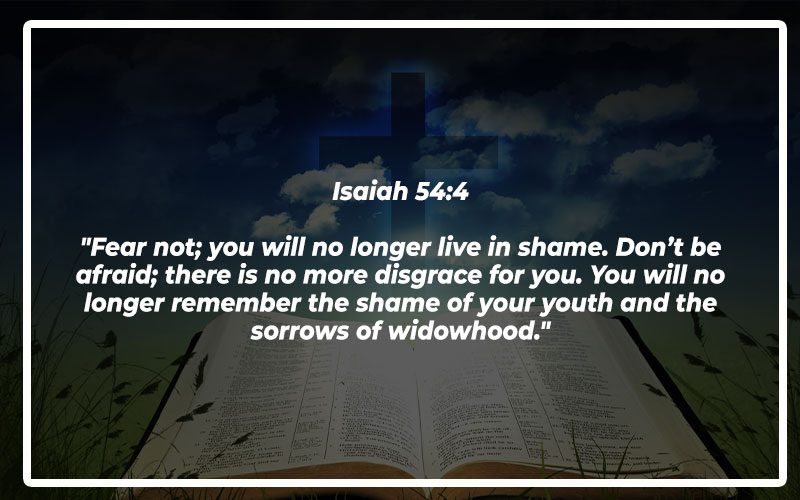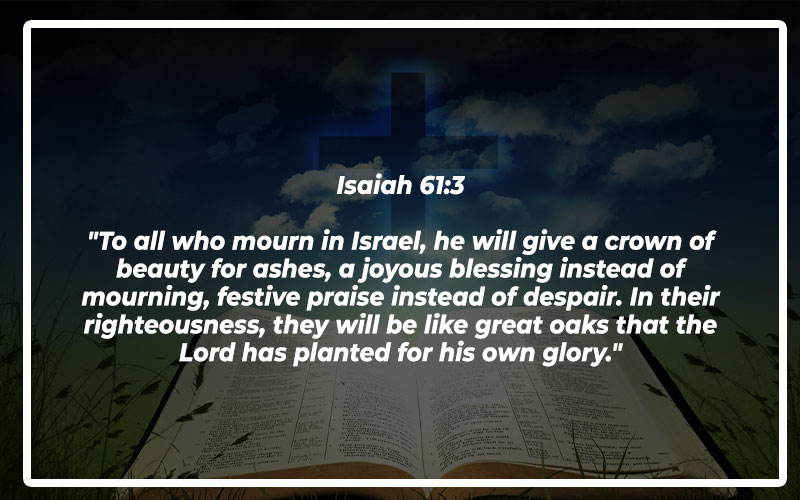Shame is a feeling many of us experience at some point in our lives. It can make us feel small, unworthy, and distant from others and even God. But the Bible has many verses that speak about shame and how we can overcome it.
By turning to Scripture, we can find comfort and strength to deal with our feelings of shame. Let’s explore these Bible verses and see how they can help us in our daily lives.
Also Read: Bible Verses About Acceptance
Top Bible Verses About Shame
Isaiah 54:4
“Fear not; you will no longer live in shame. Don’t be afraid; there is no more disgrace for you. You will no longer remember the shame of your youth and the sorrows of widowhood.”

This verse provides a message of hope and redemption, emphasizing that God’s grace removes our shame and past sorrows. It assures believers that they can live without fear of disgrace, as God has promised to restore and comfort them.
Romans 10:11
“As the Scriptures tell us, ‘Anyone who trusts in him will never be disgraced.'”
Paul reassures believers that faith in Christ ensures they will never face shame or disgrace. Trusting in Jesus brings confidence and security, freeing us from the fear of humiliation.
Joel 2:26-27
“Once again you will have all the food you want, and you will praise the Lord your God, who does these miracles for you. Never again will my people be disgraced. Then you will know that I am among my people Israel, that I am the Lord your God, and there is no other. Never again will my people be disgraced.”
This passage highlights God’s provision and presence with His people, ensuring they will never face shame. It underscores God’s commitment to His covenant and His power to bless and protect His people.
Psalms 25:3
“No one who trusts in you will ever be disgraced, but disgrace comes to those who try to deceive others.”
The psalmist expresses confidence that those who trust in God will be protected from shame, while deceitful individuals will ultimately face disgrace. This verse encourages integrity and faithfulness to God.
Psalms 31:1
“O Lord, I have come to you for protection; don’t let me be disgraced. Save me, for you do what is right.”
This plea for protection reflects a deep trust in God’s righteousness. The psalmist seeks deliverance from shame, relying on God’s justice and faithfulness.
Psalms 69:7
“For I endure insults for your sake; humiliation is written all over my face.”
The psalmist speaks of suffering shame for God’s sake, highlighting the cost of faithful devotion. This verse resonates with believers facing ridicule or persecution for their faith.
Isaiah 50:7
“Because the Sovereign Lord helps me, I will not be disgraced. Therefore, I have set my face like a stone, determined to do his will. And I know that I will not be put to shame.”
Isaiah’s confidence in God’s help removes any fear of disgrace. His determination to do God’s will exemplifies unwavering faith and commitment, ensuring he will not face shame.
Jeremiah 17:13
“O Lord, the hope of Israel, all who turn away from you will be disgraced. They will be buried in the dust of the earth, for they have abandoned the Lord, the fountain of living water.”
This verse warns that those who abandon God will face shame and disgrace. It contrasts the fate of the unfaithful with the security of those who place their hope in the Lord.
Psalms 44:15
“We can’t escape the constant humiliation; shame is written across our faces.”
The psalmist expresses the profound sense of shame and humiliation experienced by the community. This lament highlights the deep impact of disgrace and the need for God’s intervention.
Romans 1:16
“For I am not ashamed of this Good News about Christ. It is the power of God at work, saving everyone who believes—the Jew first and also the Gentile.”
Paul boldly declares his confidence in the Gospel, unashamed of its message. This verse emphasizes the transformative power of the Gospel for all who believe, overcoming any potential shame.
2 Timothy 1:8
“So never be ashamed to tell others about our Lord. And don’t be ashamed of me, either, even though I’m in prison for him. With the strength God gives you, be ready to suffer with me for the sake of the Good News.”
Paul encourages Timothy to boldly share the Gospel and not to be ashamed of Paul’s imprisonment. This verse highlights the importance of courage and reliance on God’s strength in the face of potential shame.
2 Timothy 2:15
“Work hard so you can present yourself to God and receive his approval. Be a good worker, one who does not need to be ashamed and who correctly explains the word of truth.”
Paul urges diligent study and faithful teaching of God’s word to avoid shame. This verse underscores the value of dedication and accuracy in handling Scripture.
Philippians 1:20
“For I fully expect and hope that I will never be ashamed, but that I will continue to be bold for Christ, as I have been in the past. And I trust that my life will bring honor to Christ, whether I live or die.”
Paul’s confident expectation of avoiding shame is rooted in his boldness for Christ. This verse reflects his unwavering commitment to honor Christ in life and death.
1 Peter 4:16
“But it is no shame to suffer for being a Christian. Praise God for the privilege of being called by his name!”
Peter encourages believers to view suffering for their faith as an honor rather than a source of shame. This perspective transforms persecution into an opportunity to glorify God.
Hebrews 12:2
“We do this by keeping our eyes on Jesus, the champion who initiates and perfects our faith. Because of the joy awaiting him, he endured the cross, disregarding its shame. Now he is seated in the place of honor beside God’s throne.”
Jesus’ endurance of the cross, despite its shame, serves as a model for believers. This verse emphasizes the joy and honor that follow faithful perseverance.
Proverbs 11:2
“Pride leads to disgrace, but with humility comes wisdom.”
This proverb contrasts the outcomes of pride and humility. It warns that pride leads to shame, while humility brings wisdom, highlighting the value of a humble spirit.
Also Read: Bible Verses About Guilt
Micah 7:8
“Do not gloat over me, my enemies! For though I fall, I will rise again. Though I sit in darkness, the Lord will be my light.”
Micah expresses resilience in the face of shame, trusting in God’s light and restoration. This verse encourages hope and faith despite temporary setbacks.
Jeremiah 3:25
“Let us now lie down in shame and cover ourselves with dishonor, for we and our ancestors have sinned against the Lord our God. From our childhood to this day we have never obeyed him.”
This confession acknowledges the collective shame and guilt of the people due to their disobedience. It reflects a deep recognition of sin and the need for repentance.
Daniel 12:2
“Many of those whose bodies lie dead and buried will rise up, some to everlasting life and some to shame and everlasting disgrace.”
Daniel prophesies a resurrection where some will face eternal shame. This verse highlights the ultimate consequences of one’s earthly life and decisions.
Psalms 34:5
“Those who look to him for help will be radiant with joy; no shadow of shame will darken their faces.”
The psalmist assures that seeking God’s help leads to joy and freedom from shame. This verse encourages believers to trust in God’s provision and grace.
Psalms 71:1
“O Lord, I have come to you for protection; don’t let me be disgraced.”
This prayer for protection from shame reflects a deep trust in God’s ability to deliver. It emphasizes reliance on God in times of vulnerability.
Isaiah 61:7
“Instead of shame and dishonor, you will enjoy a double share of honor. You will possess a double portion of prosperity in your land, and everlasting joy will be yours.”
Isaiah promises a reversal of shame for God’s people, granting them honor and joy. This verse highlights God’s restorative power and blessings.
Romans 5:5
“And this hope will not lead to disappointment. For we know how dearly God loves us, because he has given us the Holy Spirit to fill our hearts with his love.”
Paul emphasizes that hope in God’s love does not lead to shame. This verse reassures believers of God’s unwavering love and the indwelling presence of the Holy Spirit.
1 John 2:28
“And now, dear children, remain in fellowship with Christ so that when he returns, you will be full of courage and not shrink back from him in shame.”
John encourages believers to maintain a close relationship with Christ to avoid shame at His return. This verse emphasizes the importance of ongoing faithfulness and readiness.
Psalms 119:6
“Then I will not be ashamed when I compare my life with your commands.”
The psalmist finds confidence and freedom from shame in living according to God’s commands. This verse highlights the protective power of obedience to God’s word.
Proverbs 13:5
“The godly hate lies; the wicked cause shame and disgrace.”
This proverb contrasts the godly, who detest falsehood, with the wicked, who bring shame. It underscores the moral integrity of the righteous.
Psalms 119:46
“I will speak to kings about your laws, and I will not be ashamed.”
The psalmist’s boldness in proclaiming God’s laws, even before kings, reflects a deep confidence. This verse encourages fearless testimony of God’s truth.
2 Corinthians 4:2
“We reject all shameful deeds and underhanded methods. We don’t try to trick anyone or distort the word of God. We tell the truth before God, and all who are honest know this.”
Paul asserts the rejection of shameful practices and commitment to truthfulness. This verse highlights integrity in ministry and the importance of honesty.
Psalms 44:13
“You have made us the butt of their jokes; they shake their heads at us in scorn.”
The psalmist laments the nation’s disgrace and mockery by others. This verse reflects the deep impact of public humiliation and the need for divine intervention.
Proverbs 6:32-33
“But the man who commits adultery is an utter fool, for he destroys himself. He will be wounded and disgraced. His shame will never be erased.”
This proverb warns of the lasting shame and self-destruction resulting from adultery. It underscores the serious consequences of unfaithfulness.
Isaiah 61:3
“To all who mourn in Israel, he will give a crown of beauty for ashes, a joyous blessing instead of mourning, festive praise instead of despair. In their righteousness, they will be like great oaks that the Lord has planted for his own glory.”

Isaiah promises transformation from shame to beauty and joy. This verse highlights God’s redemptive work, bringing honor and praise in place of mourning.
Jeremiah 6:15
“Are they ashamed of their disgusting actions? Not at all—they don’t even know how to blush! Therefore, they will lie among the slaughtered. They will be brought down when I punish them, says the Lord.”
Jeremiah condemns the people’s lack of shame for their sins, predicting their downfall. This verse warns of the consequences of moral insensitivity and unrepentance.
Hebrews 2:11
“So now Jesus and the ones he makes holy have the same Father. That is why Jesus is not ashamed to call them his brothers and sisters.”
Jesus’ identification with believers, despite their imperfections, removes their shame. This verse celebrates the intimate relationship between Christ and His followers.
1 Samuel 2:30
“Therefore, the Lord, the God of Israel, says: I promised that your branch of the tribe of Levi would always be my priests. But I will honor those who honor me, and I will despise those who think lightly of me.”
God’s promise to honor those who honor Him implies the removal of shame for the faithful. This verse highlights the reciprocal nature of respect and honor between God and His people.
Isaiah 45:17
“But the Lord will save the people of Israel with eternal salvation. Throughout everlasting ages, they will never again be humiliated and disgraced.”
Isaiah prophesies eternal salvation and freedom from disgrace for Israel. This verse emphasizes God’s enduring commitment to His people and their ultimate vindication.
Zephaniah 3:19
“And I will deal severely with all who have oppressed you. I will save the weak and helpless ones; I will bring together those who were chased away. I will give glory and fame to my former exiles, wherever they have been mocked and shamed.”
God’s promise to restore honor to the oppressed and shamed exiles reflects His justice and mercy. This verse offers hope of divine vindication and restoration.
Also Read: Bible Verses About Failure
What Does the Bible Say About Shame
Shame is a profound and complex emotion, often associated with feelings of unworthiness and self-condemnation. In the Bible, shame is depicted as both a consequence of sin and a tool used by the enemy to keep believers in bondage. From the very beginning, shame entered the human experience with the fall of Adam and Eve. Their awareness of nakedness and subsequent attempt to cover themselves illustrates the instinctive reaction to hide and protect oneself from exposure.
However, the Bible also presents a path to overcoming shame. Through the narrative of God’s redemptive plan, there is a recurring theme of restoration and dignity. When people encounter God’s grace, they find that shame can be replaced with a renewed sense of worth and purpose. The prodigal son’s return to his father is a powerful example of this transformation. Despite his feelings of unworthiness and disgrace, he is welcomed back with open arms and restored to his position as a beloved son. This story demonstrates that God’s love is greater than our shame and that He seeks to restore rather than condemn.
Moreover, the Bible teaches that shame can be a tool for growth and repentance. It can prompt individuals to recognize their need for God’s grace and to seek forgiveness. This healthy form of shame leads to genuine repentance and a closer relationship with God. Conversely, toxic shame, which is often perpetuated by the accuser, seeks to isolate and destroy. It tells lies about our identity and worth, driving us further from God’s truth.
Ultimately, the Bible promises that those who trust in God will not be put to shame. This assurance is a profound comfort, offering hope that despite our past failures and the enemy’s accusations, we can stand confidently in God’s love and forgiveness. The journey from shame to dignity is a testament to the transforming power of God’s grace and the unshakeable identity we have in Him.

